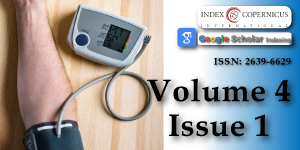Knowledge, attitude and practice towards hypertension among patients receiving care in a Nigerian Hospital
Main Article Content
Abstract
Background: Poor knowledge about hypertension can lead to poor attitude towards the disease which may directly affect patients self-care practices towards hypertension.
Objective: This study aimed to assess the knowledge, attitude and practice towards hypertension of hypertensive patients receiving care in Kogi state Specialist hospital, Lokoja, Kogi state Nigeria.
Methods: This was a cross sectional study conducted among Hypertensive patients receiving care in the Kogi State Specialist Hospital in Lokoja, Kogi state. All hypertensive patients visiting the Kogi State Specialist Hospital during the period of study and have given consent were allowed to participate in the study. A well designed questionnaire was used to collect patients soci-demographic and clinical variables. Also, a validated questionnaire was used to assess patients Knowledge, attitude and practice towards hypertension. Data were analysed using the Statistical Package for Social Sciences (SPSS for windows, Version 16.0. SPSS Inc. 2007.Chicago, USA) software. Continuous data were presented as mean± standard deviation while categorical data were presented as percentages and frequencies. Chi square and correlation test was also used to examine association between the variables in the data collected.
Results: A majority of the patients were aged 46-55 years 89 (27.5%), while almost half of the patients were males 161 (54.6%). About half of the patients 141 (43.5%) were selfemployed while a majority of the patients had at least a tertiary education 173 (53.4%). Only 4 (1.2%) of the patients reported that they had no formal education. About 60% of the patients reported to have had hypertension for 6-10 years while only 170 (57.4%) of the patients reported not to have any family history of hypertension. Also, only half of the patients 164 (50.6%) had their blood pressure controlled. Only one quarter of the patients had good knowledge and attitude towards hypertension. Also, only 4 (1.3%) patients had a good practice towards hypertension. There is a significant positive correlation between knowledge and attitude (r = 0.287, p < 0.001). Also, there is a fair positive correlation between Knowledge and practice (r = 0.254, p = <0.05), while there was no correlation between attitude and practice.
Conclusion: There was an acceptable level of Knowledge and attitude towards hypertension while these patients had a poor practice of hypertension self-care activities. Keywords: Hypertension; Knowledge, attitude, Practice.
Article Details
Copyright (c) 2020 Ukoha-Kalu BO, et al.

This work is licensed under a Creative Commons Attribution 4.0 International License.
Ogah OS, Okpechi I, Chukwuonye II, Akinyemi JO, Onwubere BJC, et al. Blood pressure, prevalence of hypertension and hypertension related complications in Nigeria: A review. World J Cardiol. 2012; 4: 327–340. PubMed: https://pubmed.ncbi.nlm.nih.gov/23272273/
Ekpenyong CE, Udokang NE, Akpan EE, Samson T. Double burden, non communicable diseases and risk factors evaluation in sub-saharan Africa: The Nigerian experience. European J Sustainable Develop. 2012; 1: 249–270.
Ulasi I, Ijoma CK, Onwubere BJ, Arodiwe E, Onodugo O, Okafor C. High prevalence and Low awareness of hypertension in a market population in enugu, Nigeria. Int J Hyperten. 2011; 8: 669–673. PubMed: https://pubmed.ncbi.nlm.nih.gov/21331378/
Oluyombo R, Olamoyegun MA, Olaifa O, Iwuala SO, Babatunde OA. Cardiovascular risk factors in semi-urban communities in southwest Nigeria: Patterns and prevalence. J Epidemiol Global Health. 2014; 5: 167-174. PubMed: https://pubmed.ncbi.nlm.nih.gov/25922326/
Bosworth HB, Olsen MK, Dudley T, Orr MM, Neary AM, et al. The take control of your blood pressure (TCYB): Study design and methodology. Contemporary Clinical Trials. 2007; 28, 33–47. PubMed: https://pubmed.ncbi.nlm.nih.gov/16996808/
Chockalingam A. Wrld hypertension day and global awareness. Can J Cardiol. 2008; 24: 441–444. PubMed: https://www.ncbi.nlm.nih.gov/pmc/articles/PMC2643187/
Sadeq R, Lafta RK. Knowledge, attitude and practice about hypertension in hypertensive patients attending hospitals in. Journal of Epidemiology and Global Health. 2017; 7: 29–34.
Sabouhi F, Babaee S, Naji H, Zadeh AH. Knowledge, awareness, attitudes and practice about hypertension in hypertensive patients referred to public health care centers in Khoor & Biabanak. Iran J Nurs Midwifery Res.2011; 16: 34–40. PubMed: https://pubmed.ncbi.nlm.nih.gov/22039377/
The JNC 7 Report. Sevent Report of the Joint National Committee on Prevention, Detection, Evaluation and Treatment of High Blood Pressure. JAMA. 2017; 289: 2660–2570. PubMed: https://pubmed.ncbi.nlm.nih.gov/12748199/
Dickinson HO, Mason JM, Nicolson DJ, Campbell F, Beyer FR, et al. Lifestyle interventions to reduce raised blood pressure: a systematic review of randomized controlled trials. J Hyperten. 206; 24: 215–233. PubMed: https://pubmed.ncbi.nlm.nih.gov/16508562/
World Health Organisation. Prevention of cardiovascular disease: guidelines for assessment and management of cardiovascular risk. WHO. 2007.

